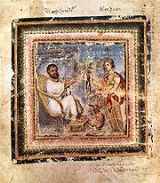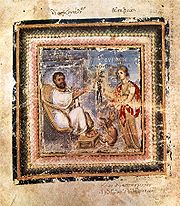
Sextius Niger
Encyclopedia
Sextius Niger was a Roman
writer on pharmacology
during the reign of Augustus
or a little later. He may be identical with the son of the philosopher Quintus Sextius
, who continued his philosophical teachings.
 From Pedanius Dioscorides
From Pedanius Dioscorides
and Pliny the Elder
, who mention his work, we can fix his time of writing to a period after Juba II
, the king of Mauretania
, had written his treatise on euphorbia, which Dioscorides and Pliny knew from Niger
, and before Pliny himself wrote his Natural History, in other words from late in the first century B.C. to the first half of the first century A.D. Caelius Aurelianus
(acut. 3, 16, 134) allows us to narrow the possible date further, by naming him as a friend of Tullius Bassus, who is cited by Scribonius Largus
(121); since Scribonius wrote in the early to mid 40s, this should narrow his period to before 40 A.D.
His pharmacological work was a materia medica
written in Greek and, according to Erotianus
, had the title περὶ ὕλης ("On material", "On [medical] substances"). Dioscorides calls him a disciple of Asclepiades of Bithynia
and speaks slightingly of him and others of the same school for a lack of care in investigating the remedies they recommend. Despite this disrespect, it seems clear that Niger was a major source for Dioscorides as he was for Pliny. Many of Pliny's books contain long stretches with close similarities to Dioscorides; and all these books are ones for which Pliny names Niger as one of his sources. Against the old view that Pliny was using Dioscorides, Wellmann notes that sometimes Pliny, sometimes Dioscorides provides a more detailed treatment and that the two were near contemporaries. Unlike Dioscorides, Pliny writes of Niger with great respect as "diligentissimus medicinae" ("a very diligent medical writer"); and Galen
also regarded him highly. The work discussed medical effects of both plants and animals; its relation to folk beliefs can be seen in his comments on the salamander
:
From an examination of the parallel passages in Dioscorides and Pliny, Wellmann believes that his sources will have included the botanist Theophrastus
and the writer on snakes Apollodorus.
Many think that Sextius Niger is also a philosopher, the son of Quintus Sextius
and his successor as the head of a school of philosophy which flourished briefly around the time of Augustus, but had died out by the time of Seneca the Younger
. The school had some resemblances to Stoicism, and recommended vegetarianism; although the elder Sextius wrote in Greek, the philosophy had a Roman character.
Ancient Rome
Ancient Rome was a thriving civilization that grew on the Italian Peninsula as early as the 8th century BC. Located along the Mediterranean Sea and centered on the city of Rome, it expanded to one of the largest empires in the ancient world....
writer on pharmacology
Pharmacology
Pharmacology is the branch of medicine and biology concerned with the study of drug action. More specifically, it is the study of the interactions that occur between a living organism and chemicals that affect normal or abnormal biochemical function...
during the reign of Augustus
Augustus
Augustus ;23 September 63 BC – 19 August AD 14) is considered the first emperor of the Roman Empire, which he ruled alone from 27 BC until his death in 14 AD.The dates of his rule are contemporary dates; Augustus lived under two calendars, the Roman Republican until 45 BC, and the Julian...
or a little later. He may be identical with the son of the philosopher Quintus Sextius
Quintus Sextius
Quintus Sextius the Elder was a Roman philosopher, whose philosophy combined Pythagoreanism with Stoicism. His praises were frequently celebrated by Seneca.-Life:...
, who continued his philosophical teachings.
Life and work

Pedanius Dioscorides
Pedanius Dioscorides was a Greek physician, pharmacologist and botanist, the author of a 5-volume encyclopedia about herbal medicine and related medicinal substances , that was widely read for more than 1,500 years.-Life:...
and Pliny the Elder
Pliny the Elder
Gaius Plinius Secundus , better known as Pliny the Elder, was a Roman author, naturalist, and natural philosopher, as well as naval and army commander of the early Roman Empire, and personal friend of the emperor Vespasian...
, who mention his work, we can fix his time of writing to a period after Juba II
Juba II
Juba II or Juba II of Numidia was a king of Numidia and then later moved to Mauretania. His first wife was Cleopatra Selene II, daughter to Greek Ptolemaic Queen Cleopatra VII of Egypt and Roman triumvir Mark Antony.-Early life:Juba II was a prince of Berber descent from North Africa...
, the king of Mauretania
Mauretania
Mauretania is a part of the historical Ancient Libyan land in North Africa. It corresponds to present day Morocco and a part of western Algeria...
, had written his treatise on euphorbia, which Dioscorides and Pliny knew from Niger
Niger
Niger , officially named the Republic of Niger, is a landlocked country in Western Africa, named after the Niger River. It borders Nigeria and Benin to the south, Burkina Faso and Mali to the west, Algeria and Libya to the north and Chad to the east...
, and before Pliny himself wrote his Natural History, in other words from late in the first century B.C. to the first half of the first century A.D. Caelius Aurelianus
Caelius Aurelianus
Caelius Aurelianus of Sicca in Numidia was a Roman physician and writer on medical topics. He is best known for his translation from Greek to Latin of a work by Soranus of Ephesus, On Acute and Chronic Diseases. He probably flourished in the 5th century, although some place him two or even three...
(acut. 3, 16, 134) allows us to narrow the possible date further, by naming him as a friend of Tullius Bassus, who is cited by Scribonius Largus
Scribonius Largus
Scribonius Largus was the court physician to the Roman emperor Claudius.About 47 AD, at the request of Gaius Julius Callistus, the emperor's freedman, he drew up a list of 271 prescriptions , most of them his own, although he acknowledged his indebtedness to his tutors, to friends and to the...
(121); since Scribonius wrote in the early to mid 40s, this should narrow his period to before 40 A.D.
His pharmacological work was a materia medica
Materia medica
Materia medica is a Latin medical term for the body of collected knowledge about the therapeutic properties of any substance used for healing . The term 'materia medica' derived from the title of a work by the Ancient Greek physician Pedanius Dioscorides in the 1st century AD, De materia medica libre...
written in Greek and, according to Erotianus
Erotianus
Erotianus was the author of a Greek work still extant, entitled Collection of Hippocratic words . It is uncertain whether he was himself a physician, and try to solve father of medicine Hippocrates or merely a grammarian, but he appears to have written some other works on Hippocrates besides...
, had the title περὶ ὕλης ("On material", "On [medical] substances"). Dioscorides calls him a disciple of Asclepiades of Bithynia
Asclepiades of Bithynia
Asclepiades was a Greek physician born at Prusa in Bithynia in Asia Minor and flourished at Rome, where he established Greek medicine near the end of the 2nd century BCE. He attempted to build a new theory of disease, based on the flow of atoms through pores in the body...
and speaks slightingly of him and others of the same school for a lack of care in investigating the remedies they recommend. Despite this disrespect, it seems clear that Niger was a major source for Dioscorides as he was for Pliny. Many of Pliny's books contain long stretches with close similarities to Dioscorides; and all these books are ones for which Pliny names Niger as one of his sources. Against the old view that Pliny was using Dioscorides, Wellmann notes that sometimes Pliny, sometimes Dioscorides provides a more detailed treatment and that the two were near contemporaries. Unlike Dioscorides, Pliny writes of Niger with great respect as "diligentissimus medicinae" ("a very diligent medical writer"); and Galen
Galen
Aelius Galenus or Claudius Galenus , better known as Galen of Pergamon , was a prominent Roman physician, surgeon and philosopher...
also regarded him highly. The work discussed medical effects of both plants and animals; its relation to folk beliefs can be seen in his comments on the salamander
Salamander
Salamander is a common name of approximately 500 species of amphibians. They are typically characterized by a superficially lizard-like appearance, with their slender bodies, short noses, and long tails. All known fossils and extinct species fall under the order Caudata, while sometimes the extant...
:
Sextius venerem accendi cibo earum, si detractis interaneis et pedibus et capite in melle serventur, tradit negatque restingui ignem ab iis.
Sextius says that sexual desire is increased by eating them, if they are preserved in honey with the guts and head and feet removed, but denies that fire can be put out by them.
From an examination of the parallel passages in Dioscorides and Pliny, Wellmann believes that his sources will have included the botanist Theophrastus
Theophrastus
Theophrastus , a Greek native of Eresos in Lesbos, was the successor to Aristotle in the Peripatetic school. He came to Athens at a young age, and initially studied in Plato's school. After Plato's death he attached himself to Aristotle. Aristotle bequeathed to Theophrastus his writings, and...
and the writer on snakes Apollodorus.
Many think that Sextius Niger is also a philosopher, the son of Quintus Sextius
Quintus Sextius
Quintus Sextius the Elder was a Roman philosopher, whose philosophy combined Pythagoreanism with Stoicism. His praises were frequently celebrated by Seneca.-Life:...
and his successor as the head of a school of philosophy which flourished briefly around the time of Augustus, but had died out by the time of Seneca the Younger
Seneca the Younger
Lucius Annaeus Seneca was a Roman Stoic philosopher, statesman, dramatist, and in one work humorist, of the Silver Age of Latin literature. He was tutor and later advisor to emperor Nero...
. The school had some resemblances to Stoicism, and recommended vegetarianism; although the elder Sextius wrote in Greek, the philosophy had a Roman character.

